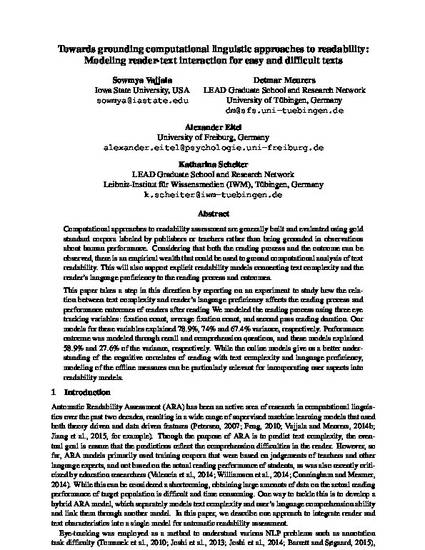
Presentation
Towards grounding computational linguistic approaches to readability: Modeling reader-text interaction for easy and difficult texts
Proceedings of the Workshop on Computational Linguistics for Linguistic Complexity
Document Type
Presentation
Conference
Computational Linguistics for Linguistic Complexity Workshop
Publication Version
Published Version
Publication Date
12-11-2016
Conference Title
Computational Linguistics for Linguistic Complexity Workshop
Conference Date
December 11-17, 2016
Geolocation
(34.6937378, 135.50216509999996)
Abstract
Computational approaches to readability assessment are generally built and evaluated using gold standard corpora labeled by publishers or teachers rather than being grounded in observations about human performance. Considering that both the reading process and the outcome can be observed, there is an empirical wealth that could be used to ground computational analysis of text readability. This will also support explicit readability models connecting text complexity and the reader’s language proficiency to the reading process and outcomes.
This paper takes a step in this direction by reporting on an experiment to study how the relation between text complexity and reader’s language proficiency affects the reading process and performance outcomes of readers after reading We modeled the reading process using three eye tracking variables: fixation count, average fixation count, and second pass reading duration. Our models for these variables explained 78.9%, 74% and 67.4% variance, respectively. Performance outcome was modeled through recall and comprehension questions, and these models explained 58.9% and 27.6% of the variance, respectively. While the online models give us a better understanding of the cognitive correlates of reading with text complexity and language proficiency, modeling of the offline measures can be particularly relevant for incorporating user aspects into readability models.
Copyright Owner
The Authors
Copyright Date
2016
Language
en
File Format
application/pdf
Citation Information
Sowmya Vajjala, Detmar Meurers, Alexamder Eitel and Katharina Scheiter. "Towards grounding computational linguistic approaches to readability: Modeling reader-text interaction for easy and difficult texts" Osaka, JapanProceedings of the Workshop on Computational Linguistics for Linguistic Complexity (2016) p. 38 - 48 Available at: http://works.bepress.com/sowmya-vajjala/13/

This is a paper from Proceedings of the Workshop on Computational Linguistics for Linguistic Complexity (2016): 38. Posted with permission.